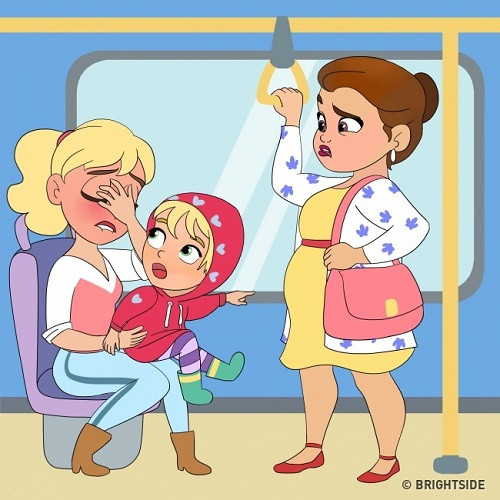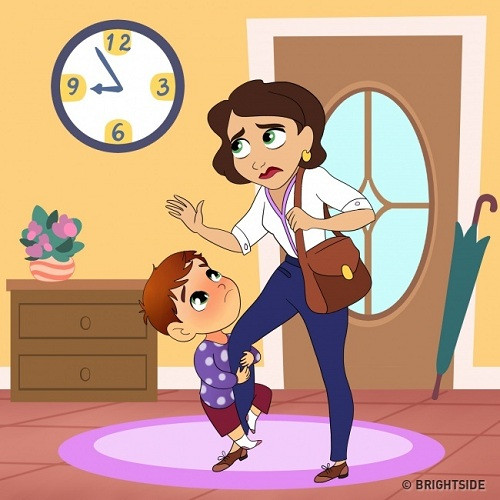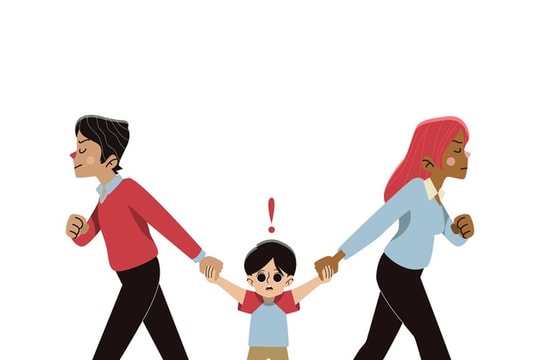How to answer 11 tough questions from kids
Ignoring questions, lying, or laughing at a child's naivety is not the right way to raise children.
Bright Side suggests answers to some of children's tricky questions.
1. Where are you from?
For the confusing question that any child would be curious about, you should answer honestly but not go into detail.
You might say, "When two people fall in love, they hug and kiss. Dad gives Mom his cells. Those cells grow with Mom's body, and a baby starts growing inside Mom's belly. The baby is tiny and swims like a fish inside. Then the baby grows bigger and bigger, and one day there's no more room in Mom's belly, and the baby comes out."
Older children can be introduced to the concept of sperm and egg.
2. Why are boys and girls different in that way?
You shouldn't feel embarrassed when asked this question, as it's completely natural for a child to be interested in their genitals.
The answer might be, "The differences are there to make babies. Boys have a penis and two testicles. Girls have a vagina and a uterus - a special bag to hold a baby someday. Boys and girls grow up, fall in love, and want to have a baby. Together, they create a baby because of these differences."
3. When I grow up, will I marry you?
Many children ask this question when they begin to feel attracted to the opposite sex. Politely say no, and explain: "Everyone has a different role in the family. Your sister can't be your dad, your dad can't be your grandma, and you can't be your mom's husband. When you grow up, she will grow old. I will still love and care for her, but I will marry someone else and love that person as much as you and I do."
4. Why do parents argue?
Children often feel guilty when their parents argue. So you can soothe them by saying, "People argue because they don't agree with each other's point of view. When children argue, adults sometimes do too. But my parents always make up because they love each other, and they love me very much."
5. Why is that girl so fat?
 |
Criticizing other people's appearance is something you should instill in your children from a young age. |
You should not scold your children and ask them to keep quiet when they describe or comment on other people's unusual appearance, because children can easily form wrong thinking patterns.
You might explain: "Everyone looks different. They can be tall or short, fat or thin. Sometimes people change their appearance because of illness. If you point out the differences, you might hurt them. You shouldn't do that. You can ask me later, when we're alone, to make sure no one gets upset by what you said."
6. Do you love me or my brother/sister more?
Siblings are often jealous of their parents' love. You should not hold one child up as an ideal model for the other children to follow, nor should you say that you love someone more because he or she is a better student.
"You are all different, and my love for each of you is expressed in different ways. But I love you all the same, just as you love me and your dad equally" is the answer you should use.
7. Will the doctor hurt me?
You need to explain to your child that treatment is necessary, and never laugh at him or call him a coward if he shows fear.
A good answer would be: "Doctors don't want to hurt you. Doctors fight germs and diseases. It will hurt a little, but if you don't feel the pain now, you won't get better. When I was sick, I got shots. I was scared, but I coped. You will too. Remember, our rabbit got sick too, and we had to take him to the doctor. He was scared. But explain to him why he shouldn't be afraid of doctors?"
8. Will I die? Will you die too?
You should not lie with this question. Children can accept the truth.
You can whisper to your child gently: "People, animals and even flowers will die one day. That is the law of life. We will die, but that day is a long way off. I will die when I am very old, when you will be grown up and have children. Then when your children grow up, you will also grow old and pass away. But the important thing is that you live a meaningful life, discovering many interesting things."
9. Why did you leave me to go to work?
 |
When children whine because their parents are at work, throwing tantrums is discouraged. |
You should explain that work is mandatory, emphasize the joy of returning home and the joy of being together again.
The answer might be something like this: "I don't want to be away from you, but I have to go to work, and I have no choice. Work is important. But remember, I'll be home tonight, and we'll have fun. Let's trade clothes, you take my bracelet, I'll take your toy. We'll feel like the other person is there even when we're not."
10. Why are parents allowed to do it, but children are not?
The truth is, you are not the ideal parent, and you should not be afraid to admit it. It is important that children understand that they should not imitate everything their parents do.
Answer your child: "Yes, Dad smokes, sometimes he stays up late using the computer. But I don't want you to repeat my mistakes. It's a bad habit that I'm trying to give up because I want to be a better person."
11. What if the monster under the bed eats me?
Take your child's fear seriously, and find ways to make it better. Let your child tell you about the monster. Then, gently offer advice like, "Did you know that monsters are afraid of spells?" and come up with a suitable phrase that your child can easily memorize.
Or give your child an old TV remote and say, "See that secret button here? When you press it, the monster disappears. Keep the remote by your bed."
According to VNE
| RELATED NEWS |
|---|


.jpg)


.jpg)


